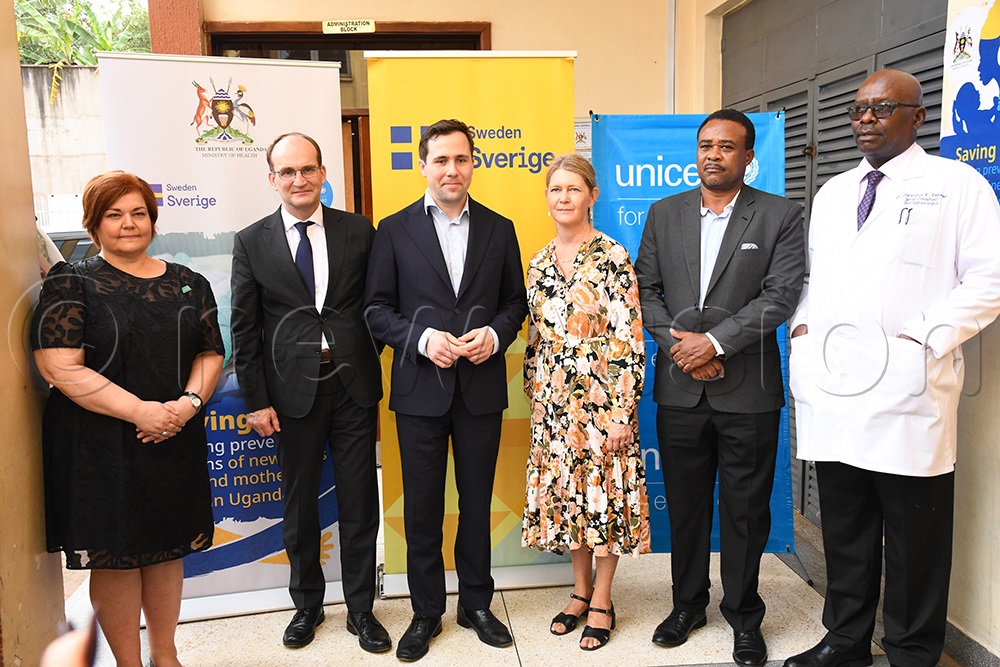Swedish minister lauds Uganda's maternal health efforts
“We recognise the strides the government is making to ensure safe deliveries for mothers, but we are also aware of the financial challenges. As the Swedish Government, we will support where we can.”
The Swedish Minister for International Development Cooperation Benjamin Dousa ( right) addressing journalists as , The Ambassador of Sweden to Uganda H.E. Maria Håkansson (left) and the acting UNICEF Uganda representative Margarita Tileva (centre) look on. (Photo by Mpalanyi Ssentongo)
By Ivan Tsebeni and Grace Kalenge
Journalists @New Vision
__________________
Sweden’s minister for international development cooperation and foreign trade, Benjamin Dousa, has inspected Kawempe National Referral Hospital and commended the Ugandan government’s contributions to maternal and newborn healthcare.
Dousa noted that Sweden’s support to the hospital is part of its broader, ongoing financial assistance to promote children’s rights and address their needs in Uganda.
“The Government of Uganda has made tremendous contributions towards improving maternal health,” he said.

Swedish Minister for International Development Cooperation Benjamin Dousa (right), with other officials paying attention to the incharge at the labour ward triage during the tour of Kawempe National Referral Hospital. (Photo by Mpalanyi Ssentongo)
“We recognise the strides the government is making to ensure safe deliveries for mothers, but we are also aware of the financial challenges. As the Swedish Government, we will support where we can,” Dousa added during his visit to the hospital in Kampala on Monday, March 17, 2025.
Dr Allan Muluta, commissioner for epidemics and disease surveillance at the Ministry of Health, praised Sweden’s role in strengthening Uganda’s health sector, particularly in supporting safe deliveries and responding to health crises such as Ebola.
“The Swedish Government has supported Uganda’s health sector for a long time. We are glad they have consistently boosted areas such as safe delivery,” Muluta said.
Maternal and neonatal health challenges
Studies indicate that Uganda continues to struggle with high maternal and neonatal mortality rates, particularly in the Kampala Metropolitan Area.
UNICEF’s acting country representative, Margarita Tileva, expressed appreciation for Sweden’s support in improving maternal and neonatal health services at Kawempe National Referral Hospital.

Swedish Minister for International Development Cooperation Benjamin Dousa (facing the camera,2nd left), the Ambassador of Sweden to Uganda H.E Maria (2nd right) with other officials being briefed by a nurse at the labour ward triage. (Photo by Mpalanyi Ssentongo)
She noted that Swedish assistance has been instrumental in reducing maternal and neonatal deaths, though further efforts are needed if Uganda is to meet its Sustainable Development Goals (SDGs) on maternal and newborn health.
“There is a critical need to invest in improving the quality of maternal and newborn healthcare, including reducing stillbirths,” Tileva said.
She outlined key areas of investment, including specialised newborn health units, high-dependency maternal units, human resources, and the use of maternal and newborn health data to improve care quality.
Tileva also highlighted the impact of teenage pregnancies on maternal and newborn mortality.
“Approximately 17 per cent of maternal deaths and 30 per cent of newborn deaths are attributed to teenage pregnancies. Reducing the number of girls who get pregnant is imperative to lowering overall maternal and newborn mortality,” she said.

Swedish Minister for International Development Cooperation Benjamin Dousa (centre), the Ambassador of Sweden to Uganda H.E. Maria Håkansson (2nd left) with other officials, paying attention to Dr.Aggrey Lubikire (right) during the tour of Kawempe National Referral Hospital. (Photo by Mpalanyi Ssentongo)
She called for a multisectoral, coordinated approach to prevent teenage pregnancies and support young expectant mothers during prenatal and postnatal periods.
Hospital capacity and equipment needs
Dr Emmanuel Byaruhanga, director of Kawempe National Referral Hospital, revealed that the facility handles an average of 70 deliveries daily, with about 25 requiring caesarean sections.

He stressed the need for additional maternal delivery equipment, citing the growing number of mothers seeking care at the hospital.
“We are grateful for the continuous support from our Swedish partners. The Ugandan Government provides 80% of our support, with donors contributing the remaining 20%,” Byaruhanga said.